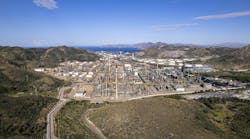A tight gasoline market and the rising probability of a tight distillate market for the winter heating season have prompted Banc of America Securities LLC to raise its earnings estimates for refiners. Gasoline inventories currently stand 4.8% below seasonal norms, while distillate inventories stand 15.9% below norms.
BAS boosted its second quarter 2000 earnings per share (EPS) estimates for independent refiners by 30% to $436 million and its full-year 2000 EPS estimates by 17% to $1.64 billion. Those numbers are based on financial data from five major independent refiners: Ashland Inc. (Ashland's refining interests are operated by the joint venture firm Marathon Ashland Petroleum LLC, in which Ashland owns a 38% stake), Sunoco Inc., Tosco Corp., Ultramar Diamond Shamrock Corp., and Valero Energy Corp.
"Owing to low gasoline supply fears, low refined product inventories, and solid demand, refining margins are averaging levels not seen since the last cyclical peak in 1997," say BAS analysts. Its 2000 earnings estimates now stand 12% above consensus, with 2001 earnings estimates 4% above consensus. BAS raised its 2001 estimates 7% to $1.35 billion.
"While we believe part of the deviation from consensus is in the market, we expect seasonally strong refining margins to last through the year and into 2001," BAS says.
The July gasoline crack spread on the New York Mercantile Exchange is currently $12.43/bbl, well above the July 1997 average of $6/bbl. Since 1993, the "gas crack", as Banc of America Securities calls it (the price of one barrel of gasoline less a barrel of West Texas Intermediate crude oil) has been between $3.70 and $6.50/bbl from June to August. This summer's strength stems from lower reformulated gasoline supplies, the result of meeting new summer specifications (RFG Phase II), and to avoid potential liability related to Unocal Corp.'s reformulated gasoline patents (OGJ, May 1, 2000, p. 35).
"This [high gas crack] strongly encourages refiners to maximize gasoline yields at the expense of distillate yields," says BAS. Refiners may choose to run lighter crude slates, which tend to yield more gasoline but less distillate, and to upgrade a portion of the distillate stream to gasoline.
BAS says RFG waivers could undermine this scenario, however. The city of St. Louis has already been granted a waiver for the June 1 start date of summer RFG Phase II specifications, although the US Environmental Protection Agency denied similar requests by Chicago and Milwaukee. BAS analysts say additional RFG waivers are unlikely, but high gasoline prices will likely increase political pressure to grant them.
Share prices for the independent refiners as a group are up 18% to date, BAS says. It believes the risk-reward profile remains attractive, especially in light of the tremendous industry fundamentals the group is experiencing.

